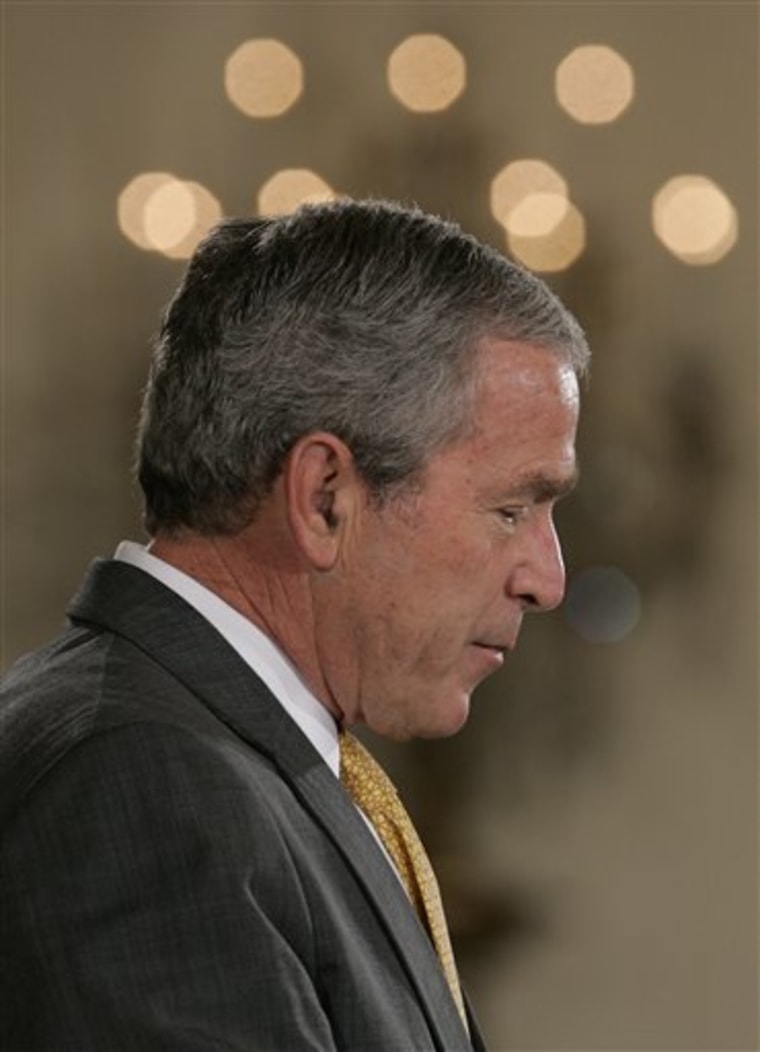Republicans in Congress are increasingly worried that their stalwart support of President Bush's Iraq war policy may cost them dearly in next year's elections. Should their solidarity crack, it could boost Democrats' efforts to start troop withdrawals.
GOP lawmakers have marched in virtual lockstep with Bush so far, supporting his troop increase, an open-ended war commitment and other policies that have grown increasingly unpopular. Privately, some express fears that their loyalty might lead them over a political cliff in 2008, when they hope to reclaim the House and Senate majorities they lost last year.
For now, there's little overt evidence of such wavering, and many Republicans say it's too late to uncouple their party's near-term fate from the war's outcome. When the House voted May 2 to sustain Bush's veto of a bill that would have imposed redeployment deadlines, only two of the chamber's 201 Republicans abandoned the president.
Still, Rep. Jack Kingston, a reliable Bush supporter from Georgia, said that vote "could have been the peak, possibly the last statement of House public solidarity with the White House. As the war develops in the next two crucial months, the political solidarity may change."
The party of the war
A question increasingly asked in the Capitol is: how big a price might the party pay if the war continues to claim U.S. casualties without quelling the anti-American insurgency?
"We have been very supportive" of the administration's Iraq policy, Kingston said in an interview with The Associated Press. But among GOP House members, he said, "there are discussions on the floor: 'Hey, 30 members lost their seats last year, and a lot of them lost because of the war.'"
It might not matter, said Republican pollster Tony Fabrizio. "As a party, we are locked into being the party of the war in Iraq - right, wrong or indifferent," he said. "The only salvation for us is that it works."
Fall deadline
Sen. Gordon Smith of Oregon, one of two Senate Republicans to oppose the latest spending bill for the conflict, said the war "is a problem because it's defining our party to the American people, and the American people have lost faith in this cause."
"Many Republican colleagues are simply waiting until September," he said, citing the deadline Bush gave to Army Gen. David Petraeus for a progress report on the war. Unless there is a dramatic turnabout by then, Smith said, the party's near-unanimity is almost certain to fracture.
Some Republican lawmakers report considerable support in their states or districts for Bush's campaign against terrorism, despite widespread frustration over the war's longevity and casualty rates. But a number of conservative commentators recently have said elected Republicans are becoming dangerously out of step with mainstream public opinion, and at least one GOP Senate aide has distributed copies of the articles as a warning to colleagues.
"There's a lot of nervousness," said Rep. Ray H. LaHood, R-Ill., who has backed Bush's war policies. He said a fellow House member recently recounted visiting a coffee shop full of Republicans in his home district and finding "none of them supports what we're doing over there."
Some Republican leaders say their stand on Iraq is a matter of principle, not politics, and they suggest they will accept electoral setbacks if that is the cost.
"When you think about what Iraq means to our nation, and what failure in Iraq will mean to our nation, it's really far more important than any election," House Minority Leader John Boehner of Ohio told reporters Thursday. He later added that he expects to lose no GOP seats over the issue in 2008, because "I'm planning on victory in Iraq."
Public opinion
For many months, polls have found overwhelming opposition to the president's war policies among Democratic voters. But in a worrisome sign for Republicans, a large proportion of self-identified independents now share that view.
In an April poll by AP-Ipsos, 61 percent of independents said going to war in Iraq was a mistake, and 56 percent felt it was a hopeless cause. By contrast, three-quarters of Republicans called the war a worthy cause.
Because many GOP-held House districts are overwhelmingly conservative - just as many Democratic-held districts are heavily liberal - there is less concern about Iraq's political ramifications among Republican House members than senators, who represent entire states.
But among those watching the situation most anxiously are GOP senators facing re-election next year in competitive states, such as Smith of Oregon, John Warner of Virginia, Susan Collins of Maine, John Sununu of New Hampshire and Norm Coleman of Minnesota.
Some Republicans, especially those from strongly conservative House districts, say pollsters and commentators are overstating the party's political peril.
"We're not in despair. We're not in isolation," said Rep. Pete Sessions, R-Texas.
While many Americans clearly want to withdraw from Iraq promptly, "the far vaster group of people think Congress had better not stand up our guys" in uniform, Sessions said.
